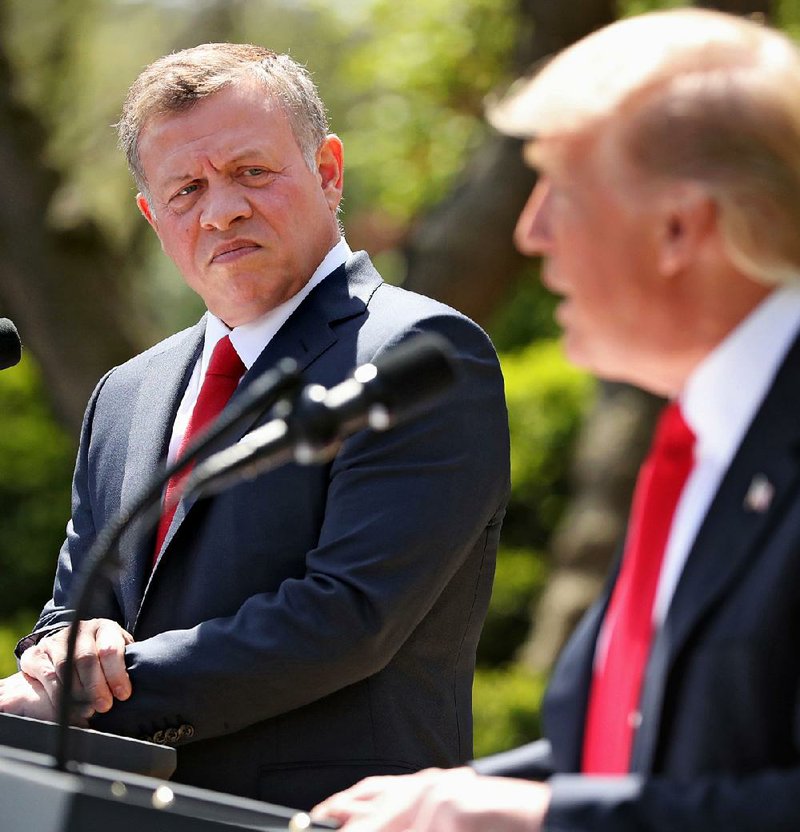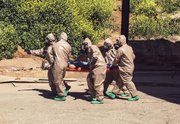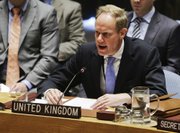UNITED NATIONS -- Holding photographs of dead Syrian children after a suspected chemical bomb attack, the U.S. ambassador to the United Nations warned Wednesday that her country might take unilateral action if the Security Council failed to respond to the latest atrocity in the Syria war.
Nikki Haley also used her remarks at an emergency session to blame Russia for blocking a robust response to Tuesday's attack on a northern Syrian town, which has incited widespread condemnation. The death toll was reported to exceed 100.
Haley's criticism of Syrian President Bashar Assad's government also came as President Donald Trump adopted a tougher tone toward the Syrian leader. At a White House news conference Wednesday with Jordan's King Abdullah II, Trump said the attack "crossed a lot of lines for me" and that his attitude toward "Syria and Assad has changed very much."
The U.S., France and the United Kingdom have accused the Syrian government of responsibility and criticized Russia -- Syria's main ally in the 6-year-old war -- for objecting to a resolution they drafted condemning the attack.
[PRESIDENT TRUMP: Timeline, appointments, executive orders + guide to actions in first 100 days]
Russia has said insurgents may have been responsible or that the attack may have been fabricated to embarrass Assad.
"Time and time again Russia uses the same false narrative to deflect attention from their allies in Damascus," Haley said. "How many more children have to die before Russia cares?"
She closed her remarks with a warning: "When the United Nations consistently fails in its duty to act collectively, there are times in the life of states that we are compelled to take our own action," she said. "For the sake of the victims, I hope the rest of the council is finally willing to do the same."
She did not provide further details.
The French ambassador to the United Nations, Francois Delattre, called on Russia to stand up to the use of chemical weapons, and on the United States to show leadership on Syria. Delattre called the attack on Tuesday "a new act of barbarism."
The British envoy, Matthew Rycroft, pushed his fellow diplomats to act or lose all credibility in the eyes of the public. "They view us as a table of diplomats doing nothing, our hands tied behind our backs, beholden to Russian intransigence," he said.
Russia dismissed the comments, saying, "At this stage, we don't see a particular need." Its deputy ambassador, Vladimir Safronkov, went on to scold the resolution's drafters for expressing "horror" at the attack. "Have you even checked what you wrote? This draft was prepared in a hasty way."
The Security Council meeting was adjourned, and ambassadors from the five permanent members negotiated privately to devise compromise language on a resolution.
There was no word on when a vote might be held.
Diplomats were continuing to negotiate "in good spirit," Delattre said. Asked about his U.S. counterpart's suggestion of unilateral action in the absence of a consensus, Delattre demurred. "Action by the Security Council would be by far the best option," he said.
"I'm concerned by inaction at this stage, the risk of inaction."
Attitude change
Trump, in his news conference, refused to say what the U.S. might do in response. "I'm not saying I'm doing anything one way or another, but I'm certainly not going to be telling you," he told reporters.
He blamed the attack squarely on Assad's forces, though the Syrian leader and his Russian backers denied it. He suggested that the assault that killed more than 100 people had diminished his former reluctance to plunge the U.S. further into the complex and dangerous turmoil in the Middle East.
"When you kill innocent children, innocent babies -- babies, little babies -- with a chemical gas that is so lethal, people were shocked to hear what gas it was, that crosses many, many lines," Trump said in the White House Rose Garden. U.S. officials said the gas was likely chlorine, with traces of a nerve agent like sarin.
While continuing to fault predecessor Barack Obama for much of the current situation in Syria, Trump acknowledged that dealing with the crisis is now his own responsibility and vowed to "carry it very proudly."
Only days earlier multiple members of Trump's administration said Assad's ouster was no longer a U.S. priority, drawing anger from Assad critics in the U.S. and abroad. But Trump said Tuesday's attack "had a big impact on me -- big impact."
"My attitude towards Syria and Assad has changed very much," he said.
Obama had put Assad on notice that using chemical weapons would cross a "red line" necessitating a U.S. response, but then failed to follow through, pulling back from planned airstrikes after Congress wouldn't vote to approve them. Trump and other critics have cited that as a key moment the U.S. lost much global credibility.
"I now have responsibility," Trump said. "That responsibility could be made a lot easier if it was handled years ago."
Defense Secretary James Mattis, asked about the attack before his meeting with the Singaporean defense minister in Washington, said, "It was a heinous act and will be treated as such."
In Brussels, at a meeting of donor countries for Syrian humanitarian relief convened by the European Union, Antonio Guterres, the U.N. secretary-general, declared that "war crimes are going on in Syria."
Asked whether Assad's government was responsible, Guterres called for "a very clear investigation to remove all doubts."
Condemnation also came from Pope Francis, who called the attack "an unacceptable massacre"; the NATO secretary-general, Jens Stoltenberg, who deplored "the use of these barbaric weapons"; and Donald Tusk, president of the European Council, who said that Syria's government bore primary responsibility.
The Brussels conference produced pledges of $6 billion for 2017, Christos Stylianides, the European commissioner for humanitarian aid, announced Wednesday evening when the meeting concluded. That was less than half of the amount pledged a year ago.
The war in Syria has taken nearly 400,000 lives, monitoring groups have said, and has displaced roughly half of all Syrians from their homes.
Victims tell of cloud
In the town of Khan Sheikhoun in Idlib province, where the attack took place, rescue workers continued to look for and help survivors, some hiding in shelters.
Medical organizations working inside Syria said they had treated more than 500 people who inhaled the still unidentified chemical.
The World Health Organization reported that medical treatment facilities in the attacked region were overwhelmed, that many stricken people had been sent across the border to Turkey and that some had shown symptoms consistent with exposure to "a category of chemicals that includes nerve agents."
Assad's government was supposed to have destroyed its stockpiles of nerve agents more than three years ago in an attempt to stave off U.S. military intervention.
Doctors Without Borders said its medics treated patients with diluted pupils, muscle spasms and involuntary defecation "consistent with exposure to neurotoxic agents such as sarin."
Long-standing global treaties have banned the use of chemical weapons, including sarin, a substance that can kill within minutes.
In southern Turkey, witnesses evacuated for treatment described being enveloped by a fog of chemicals and said that rescue workers passed out among the people they were trying to help.
"Some people died as they were sleeping. The ones who did not, especially the children, were foaming at the mouths and shaking," said a resident, Hussein al-Nimr. "We tried to rescue people, but then we fell down, too."
In Khan Sheikhoun, families spoke of grief and a sense of betrayal.
"If the world wanted to stop this, they would have done so by now," a woman who gave her name as Om Ahmed said in a telephone interview. "One more chemical attack in a town the world hasn't heard of won't change anything."
Then her voice cracked. "I'm sorry. My son died yesterday," she said. "I have nothing left to say to the world."
Hussam Abu Ammash, 43, clutched a list of 21 names of relatives he said were killed in the attack. "When people woke up and saw the cloud, they thought it was the dust of an airstrike and they ran toward it. But it was chemical gases," he said.
The first known use of chemicals as weapons in Syria's civil war came in 2012, and the attack on Tuesday was the most devastating since an August 2013 sarin gas assault around the town of Ghouta that left hundreds dead and challenged Obama's declaration that the use of chemical weapons would amount to a "red line."
Obama considered a more direct U.S. intervention in the conflict, but he ultimately decided against one.
While Tuesday's assault was widely attributed to the Syrian government, Russia tried Wednesday to shift the blame to armed groups opposing Assad.
Maj. Gen. Igor Konashenkov, a Russian military spokesman, said Syrian warplanes had been targeting rebel workshops on the eastern outskirts of Khan Sheikhoun, which is in rebel-held Idlib province. "The territory of this storage facility housed workshops to produce projectiles filled with toxic agents," he said in a recorded statement.
His comments marked a rare admission that airstrikes had taken place in the area. Moscow typically denies knowledge of such mass-casualty attacks and has previously falsified video footage in an attempt to exonerate its warplanes.
Russia also blamed the 2013 attack on rebels it said were attempting to provoke international intervention.
The Hague-based Organization for the Prohibition of Chemical Weapons, which is responsible for ensuring that nations live up to the weapons ban, would lead any investigation on the ground in Syria in partnership with the United Nations.
Rescue workers said they had gathered soil samples from Khan Sheikhoun and sent them to Western intelligence officials for analysis.
The Syrian government has denied any involvement in Tuesday's attack or use of chemical weapons.
Information for this article was contributed by Somini Sengupta, Rick Gladstone, James Kanter, Sewell Chan and Michael R. Gordon of The New York Times; by Louisa Loveluck and Zakaria Zakaria, Andrew Roth, Michael Birnbaum and Brian Murphy of The Washington Post; and by Josh Lederman, Vivian Salama, Ken Thomas, Lolita C. Baldor, Bradley Klapper, Vladimir Isachenkov and Edith M. Lederer of The Associated Press.
A Section on 04/06/2017


